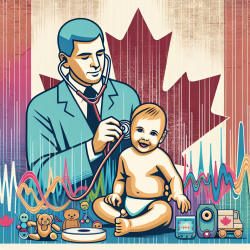Revolutionizing NICU Care with Music Therapy: A Data-Driven Approach
The role of music therapy in the Neonatal Intensive Care Unit (NICU) is gaining recognition for its potential to transform care for hospitalized infants and their families. The recent study, "Music Therapy in the Neonatal Intensive Care Unit: A Center’s Experience with Program Development, Implementation, and Preliminary Outcomes," provides compelling evidence for the integration of music therapy into NICU operations. This blog explores the key findings and how practitioners can harness these insights to enhance their skills and improve outcomes for children.
Why Music Therapy?
The NICU environment is often characterized by high noise levels from medical equipment, which can negatively impact the neurodevelopment of very preterm (VP) infants. Music therapy offers a promising solution by providing enriching auditory experiences that promote infant development and strengthen parent-infant relationships. The study highlights several benefits of music therapy in the NICU, including:
- Reduction in infant stress and enhanced autonomic stability.
- Improvement in feeding behaviors and state regulation.
- Enhanced brain development and connectivity.
- Reduction in parental anxiety and family psychosocial distress.
Implementing Music Therapy in the NICU
The study describes the successful rollout of a pilot music therapy program within a level-III NICU. Key components of the program include:
- Promoting Infant Development: Live music interventions support stress mitigation, promote social interaction, and improve behavioral organization.
- Family Education and Coaching: Music therapists work with parents to enhance their understanding of their infant's developmental needs and facilitate early communication exchanges.
- Collaboration with Medical Staff: The program integrates music therapy with existing medical and neurodevelopmental services, ensuring a cohesive approach to care.
- Supporting Research Initiatives: The program partners with ongoing research to further study the effects of music therapy in the NICU.
Preliminary Outcomes and Feedback
Initial program metrics show promising results, with an increase in the number of infants receiving music therapy sessions over time. Families and staff have expressed positive feedback, noting the calming and bonding effects of music therapy. Parents have reported enjoying the sessions and feeling more connected to their infants.
Challenges and Future Directions
While the program has seen success, challenges remain, such as securing sustainable financial support and expanding eligibility criteria for music therapy services. Further research is needed to strengthen the evidence base and explore the safety and efficacy of music therapy for higher-risk populations.
In conclusion, music therapy holds significant promise for enhancing NICU care. By aligning practices with current data and recommendations, practitioners can deliver a safe, evidence-based therapeutic experience that benefits infants and their families.
To read the original research paper, please follow this link: Music Therapy in the Neonatal Intensive Care Unit: A Center’s Experience with Program Development, Implementation, and Preliminary Outcomes.










